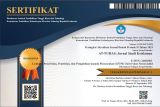Allen, M. (2004). Smart Thinking: Skill for Critical Understanding and Writing. UK: Oxford University Press.
Aslamiyah, S. S. (2013). Problematika Pendidikan Islam di Indonesia. Al-Hikmah: Jurnal Studi Keislaman, 3(1), 73–87.
Branford, J. D., & Stein, B. S. (1993). The Ideal Problem Solver: A Guide for Improving Thinking, Learning and Creativity. New York: W.H. Freeman.
Butterworth, J., & Thwaites, G. (2013). Thinking Skills: Critical Thinking and Problem Solving. UK: Cambridge University Press.
Choiri, M. M., & Fitriani, A. (2011). Problematika Pendidikan Islam Sebagai Sub Sistem Pendidikan Nasional di Era Global. Al-Tahrir: Jurnal Pemikiran Islam, 11(2), 303–325.
Elfiky, I. (2009). Quwwat Al-Tafkir, Terj. Khalifurrahman Fath dan M. Taufik Damas, Terapi Berpikir Positif. Jakarta: Zaman.
Hasan, C. (1994). Dimensi-Dimensi Psikologi Pendidikan. Surabaya: Al-Ikhlas.
Hidayat, F. N., & Karyodiputro, M. I. (2019). Manajemen Madrasah dalam Mewujudkan Pendidikan Karakter Peserta Didik di MTs Negeri Bondowoso II. At-Turas: Jurnal Studi Keislaman, 6(1), 14–34.
Hidayat, T., Abdussalam, A., & Fahrudin. (2016). Konsep Berpikir (Al-Fikr) dalam Alquran dan Implikasinya Terhadap Pembelajaran PAI di Sekolah (Studi Tematik Tentang Ayat-Ayat yang Mengandung Term Al-Fikr). Tarbawy: Indonesian Journal of Islamic Education, 3(1), 1–12.
Indra, H. (2016). Pendidikan Islam: Tantangan dan Peluang di Era Globalisasi. Yogyakarta: Penerbit Deepubish.
Izzan, A. (2013). Ulumul Quran. Bandung: Tafakkur.
Karim, S. A., & Dozan, W. (2021). Pengembangan Mutu dan Resolusi Konflik Melalui Total Quality Manajemen (TQM) Berbasis Pendidikan Islam. Al-Ilm: Jurnal Pendidikan Dan Hukum, 3(1), 45–58.
Kartono, K. (1985). Bimbingan dan Dasar-Dasar Pelaksanaannya: Teknik Bimbingan Praktis. Jakarta: CV. Rajawali.
Kuntoro, A. T. (2019). Manajemen Mutu Pendidikan Islam. Jurnal Kependidikan, 7(1), 84–97.
Lubis, A. M. (2016). Konseling Islami dan Problem Solving. Ri’ayah: Jurnal Sosial Dan Keagamaan, 1(2), 110–122.
Lubis, S. A. (2015). Konseling Islami: dalam Komunitas Pesantren. Bandung: Citapustaka Media Perintis.
Lubis, S. A. (2021). Konseling Pendidikan Islam Perspektif Wahdatul ‘Ulum. Medan: Perdana Publishing.
Napitupulu, D. S. (2021). Modernisasi Pendidikan Islam: Pengalaman Lembaga Pendidikan Al-Ittihadiyah. Journal of Education and Teaching Learning (JETL), 3(3), 41–56.
Nata, A. (2011). Studi Islam Komprehensip. Jakarta: Kencana.
Nata, A. (2012). Manajemen Pendidikan: Mengatasi Kelemahan Pendidikan Islam di Indonesia. Jakarta: Kencana.
Nurlaela, A. (2018). Menakar Nalar Pendidikan Pesantren Berbasis Kearifan Lokal. At-Turas: Jurnal Studi Keislaman, 5(2), 206–224.
Saleh, A. R. (2008). Psikologi: Suatu Pengantar dalam Perspektif Islam. Jakarta: Kencana.
Shofa, M., Nailufa, L. E., & Haqiqi, A. K. (2020). Pembelajaran IPA Terintegrasi Al-Quran dan Nilai-Nilai Pesantren. IJIS Edu: Indonesian Journal of Integrated Science Education, 2(1), 81–90.
Subagyo, J. (1991). Metodologi Penelitian: Teori dan Praktik. Jakarta: Rineka Cipta.
Suharna, H. (2018). Teori Berpikir Reflektif: dalam Menyelesaikan Masalah Matematika. Yogyakarta: Penerbit Deepubish.
Surya, H. (2009). Menjadi Manusia Pembelajar. Jakarta: PT. Elex Media Komputindo.
Suryabrata, S. (2004). Psikologi Pendidikan. Jakarta: PT. RajaGrafindo Persada.
Umar, M., & Ismail, F. (2018). Peningkatan mutu lembaga pendidikan Islam (Tinjauan konsep mutu Edward Deming dan Joseph Juran). Jurnal Ilmiah Iqra’, 11(2), 14–24.
 (STIT Al-Ittihadiyah, Labuhanbatu Utara)
(STIT Al-Ittihadiyah, Labuhanbatu Utara) 




.png)






